Queer Pentecost on Late Night TV
We were a number of months into the pandemic when a clip of a late-night show caught my eye. “You have to see this!” my feeds echoed. Scraping the bottom of the well of all my reserves that were being used up keeping our queer little family safe and alive in a time of global pandemic and racial justice reawakening while also starting a new job I wearily clicked through looking for a moment of distraction or levity. And then I watched as Alanis Morrisette relived every meeting I had been trying to have over Zoom for the last months on national late night television—holding her small child she performed her song “Ablaze” being interrupted to have to explain what she was doing, having her equipment tugged at, and still delivering a powerful performance. The delivery of the song was enough to win me over and give me a moment of feeling seen but the song itself is what has kept it on my playlist for these many months that have followed. You see, the song is an oath to her children. It sings to them lifting up that which makes them uniquely glorious and says “I see you; I love you” and it is a naming of the commitment as their parent to keep the fire in their eye ablaze.
This song speaks to me, particularly as a queer mom of a young child. It’s a reminder that even in these times and with so much out of my control it is my duty to this precious human being to kindle the light in her eyes. To help her understand her inherent worth and dignity and to kindle a flame within her that sees and fights for the recognition of that same worth and dignity in others.
But this is not just a song about parenting. Moving through this month of pride and having just celebrated Pentecost what better time to be reminded that we are called into community through God’s love with the express responsibility to keep the fire in each other’s eyes ablaze. Ablaze with the promise that we are all made in the image of God, imago Dei, and beloved of God. Ablaze with the promise that the unique gifts and stories of our lives are welcome and necessary here in this time and place. Ablaze with a fire to continue to be a part of the difficult and essential work of dismantling White supremacy culture within our church and our world. Ablaze with the fire and promise of righteous anger on which pride began. Ablaze with the audacious hope that all might flourish.
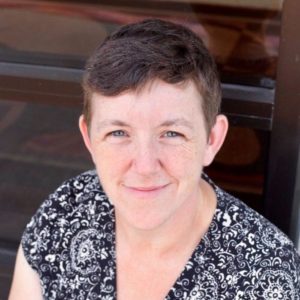 Dr. Melissa James (she/her) is a Minister of Word and Service (Deacon) in the Evangelical Lutheran Church of America (ELCA). She currently serves the Unitarian Universalist Association as a congregational consultant for the Pacific Western Region and teaches at the University of San Diego in Sociology and Gender Studies. She lives in La Mesa, CA with her wife and 4-year-old daughter.
Dr. Melissa James (she/her) is a Minister of Word and Service (Deacon) in the Evangelical Lutheran Church of America (ELCA). She currently serves the Unitarian Universalist Association as a congregational consultant for the Pacific Western Region and teaches at the University of San Diego in Sociology and Gender Studies. She lives in La Mesa, CA with her wife and 4-year-old daughter.

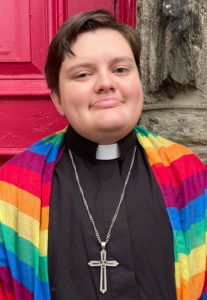 Cari States-Codding (Pronouns: any, if used respectfully) is a third-year seminarian, preparing for their capstone internship. Cari and their husband live with their two fur gremlins, Archie and Thor, and their three-member support staff has helped give them life throughout seminary.
Cari States-Codding (Pronouns: any, if used respectfully) is a third-year seminarian, preparing for their capstone internship. Cari and their husband live with their two fur gremlins, Archie and Thor, and their three-member support staff has helped give them life throughout seminary. 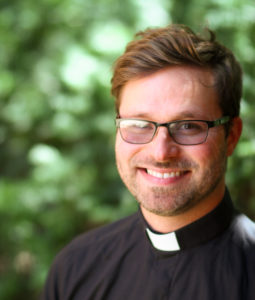 Alex Aivars (he/him) is currently starting his second call as pastor of Christ in Dewitt, MI. Since this is a part-time call, he also develops websites for businesses, non-profits, and churches. In his spare time he likes to dance, be outdoors, travel, and read.
Alex Aivars (he/him) is currently starting his second call as pastor of Christ in Dewitt, MI. Since this is a part-time call, he also develops websites for businesses, non-profits, and churches. In his spare time he likes to dance, be outdoors, travel, and read.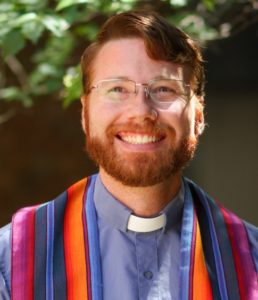 Caleb Crainer (he/him) serves as Pastor at St. Andrew’s Lutheran Church in Los Angeles, California, as the Dean of the LA Metro Conference in the Southwest California Synod, and as the First-Call Accompaniment Coaching Convener in Proclaim. His favorite parts of ministry are having his congregation sing in different languages and the grace they show each other when things are mispronounced.
Caleb Crainer (he/him) serves as Pastor at St. Andrew’s Lutheran Church in Los Angeles, California, as the Dean of the LA Metro Conference in the Southwest California Synod, and as the First-Call Accompaniment Coaching Convener in Proclaim. His favorite parts of ministry are having his congregation sing in different languages and the grace they show each other when things are mispronounced.
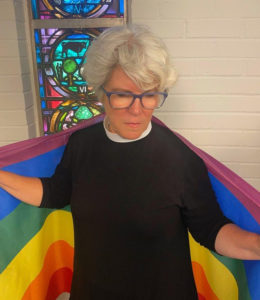 Brenda Bos (she/her) is the first openly lesbian bishop elected in the ELCA. She serves the Southwest California Synod, whose territory sits on the homeland of eleven indigenous peoples and includes the Hollywood sign, “The Valley”, coastal cities, farmland and urban deserts. She and her wife Janis spend their free time hiking with their dogs and making their house more fun for their young granddaughter.
Brenda Bos (she/her) is the first openly lesbian bishop elected in the ELCA. She serves the Southwest California Synod, whose territory sits on the homeland of eleven indigenous peoples and includes the Hollywood sign, “The Valley”, coastal cities, farmland and urban deserts. She and her wife Janis spend their free time hiking with their dogs and making their house more fun for their young granddaughter. 
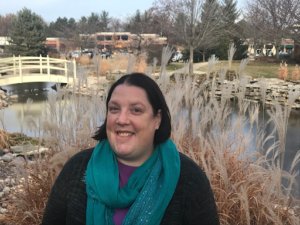 Kristin Rice (she/hers) is an ordained pastor in the ELCA. She currently serves as the part-time community chaplain for the Attic Angel Community in Madison, Wisconsin. Kristin spends her non-ministry time with her fluffy overlord Blessing taking many weekend walks through dog parks and playing hours of fetch. Kristin also takes pride in the level of coffee snobbery she has curated over the years.
Kristin Rice (she/hers) is an ordained pastor in the ELCA. She currently serves as the part-time community chaplain for the Attic Angel Community in Madison, Wisconsin. Kristin spends her non-ministry time with her fluffy overlord Blessing taking many weekend walks through dog parks and playing hours of fetch. Kristin also takes pride in the level of coffee snobbery she has curated over the years. Third: Show us a vision of world made new. Even when we aren’t sure if “a world made new” is possible. Even when our ability to cast new visions is exhausted.
Third: Show us a vision of world made new. Even when we aren’t sure if “a world made new” is possible. Even when our ability to cast new visions is exhausted. Aaron Musser (he/him) is a second-year MDiv student pursuing ordination in Word and Sacrament at the Lutheran School of Theology at Chicago. Before seminary he served in Milwaukee, WI as a church musician and music educator. He finds joy in natural things, in queer performance art, in beautiful music, and in cherry chocolate chip ice cream.
Aaron Musser (he/him) is a second-year MDiv student pursuing ordination in Word and Sacrament at the Lutheran School of Theology at Chicago. Before seminary he served in Milwaukee, WI as a church musician and music educator. He finds joy in natural things, in queer performance art, in beautiful music, and in cherry chocolate chip ice cream. But strangely, I felt held. Not by the God who expected a perfectly executed Lenten season, but by the God who met me in places I didn’t expect. This God held the frantic scribbles in my journals, my defeated body that couldn’t muster the energy to pull itself up off of my bedroom floor, and my midnight whisper to the sky one night – “I think I’m gay.” In the quiet of quarantine, I noticed God’s closeness – so close that I could feel her breath on my cheek. I wondered how long she’d had her hand in mine. Slowly, my body began to feel like church. It was all I had left for flesh and blood worship, and it turned out, it was all I needed.
But strangely, I felt held. Not by the God who expected a perfectly executed Lenten season, but by the God who met me in places I didn’t expect. This God held the frantic scribbles in my journals, my defeated body that couldn’t muster the energy to pull itself up off of my bedroom floor, and my midnight whisper to the sky one night – “I think I’m gay.” In the quiet of quarantine, I noticed God’s closeness – so close that I could feel her breath on my cheek. I wondered how long she’d had her hand in mine. Slowly, my body began to feel like church. It was all I had left for flesh and blood worship, and it turned out, it was all I needed.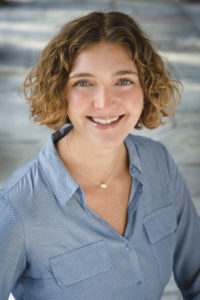 Natalie Benson (she/her) is a third year Master’s of Divinity student at Yale Divinity School and an aspiring university chaplain. A proud Midwesterner- Natalie grew up in Bloomington, IL and later went to the University of Indianapolis, where she studied Psychology and Religion. In college, she discovered a deeper connection to her Lutheran faith through interfaith dialogue. If ministry doesn’t work out, Natalie would be happy living on the beach and enjoying her new-found love for surfing.
Natalie Benson (she/her) is a third year Master’s of Divinity student at Yale Divinity School and an aspiring university chaplain. A proud Midwesterner- Natalie grew up in Bloomington, IL and later went to the University of Indianapolis, where she studied Psychology and Religion. In college, she discovered a deeper connection to her Lutheran faith through interfaith dialogue. If ministry doesn’t work out, Natalie would be happy living on the beach and enjoying her new-found love for surfing.